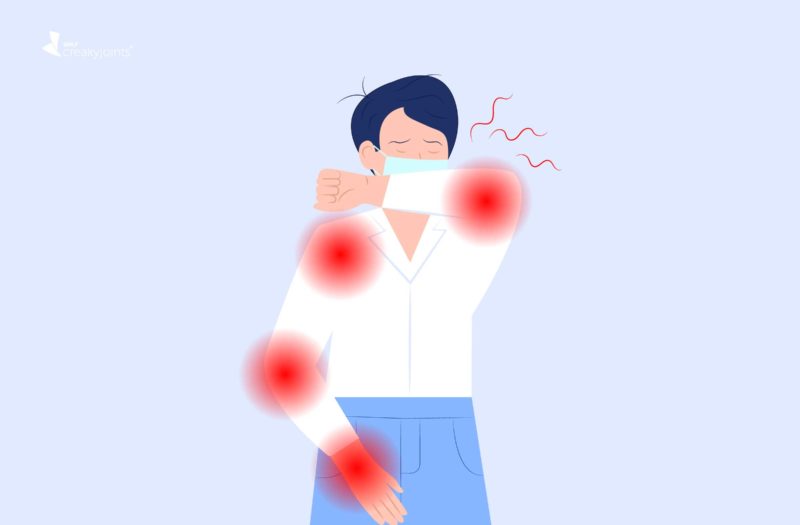Learn more about our FREE COVID-19 Patient Support Program for chronic illness patients and their loved ones.
Key Takeaways
- Long-haul COVID is when people who have been infected with the coronavirus experience new, returning, or ongoing health problems four or more weeks after first being infected.
- It is unclear, however, as to what makes people more susceptible to long-haul COVID.
- New research presented at ACR Convergence 2021 has gained insight into risk factors for long-haul COVID-19, specifically in rheumatology patients.
- The research suggests people with long-haul COVID are more likely to have one or more medical comorbidities and/or be a current or former smoker.
There is still a lot to learn about COVID-19 long-haulers, people who experience ongoing symptoms after being infected with COVID-19. Are certain people more at risk for developing long-haul COVID because of pre-existing underlying health issues, certain COVID-19 symptoms, or the severity of their COVID infection?
New research provides hints as to some potential risk factors for long-haul COVID-19 specifically in rheumatology patients.
In a preliminary study presented at ACR Convergence 2021, the annual meeting of the American College of Rheumatology, researchers from Hospital for Special Surgery (HSS) emailed a survey to adult patients who were evaluated at least once by a rheumatologist at a large rheumatology center in New York City.
The researchers also collected data on sociodemographics, medical comorbidities, medication use, and health-related quality of life as well as detailed information about COVID-19 diagnoses. COVID-19 status was determined by positive testing or the patient being told by a health care provider that they likely had COVID-19 (since testing was not readily available in New York City at the beginning of the pandemic).
The researchers compared “long-haul” COVID patients (those with symptoms persistent for at least one month) to those who had COVID-19 symptoms for less than a month. Among the 2,572 people who completed the questionnaire, 254 patients noted a history of suspected or confirmed COVID-19 — and 55.9 percent of those had symptoms lasting longer than one month.
There were no significant differences in demographics, including age, gender, or race, observed between the two groups. However, COVID-19 long-haulers were more likely to:
- Have one or more medical comorbidities
- Be current or former smoker
There was no significant difference in the proportion of long haulers with a systemic rheumatic disease (such as inflammatory arthritis, spondyloarthritis, vasculitis, lupus, etc.) compared to those without.
However, patients with long-haul COVID-19 were more likely to have used corticosteroids for three or more months at the time of COVID-19 diagnosis. Further research is needed to establish whether chronic immunosuppression with corticosteroids predisposes patients to post-viral symptoms.
“We were surprised to see that we had a substantial group of patients who were long-haulers,” says Medha Barbhaiya, MD, a rheumatologist at the Hospital for Special Surgery and a lead author of the study. “We do not yet know the prevalence of long haul COVID-19 in patients with rheumatic diseases or the extent of symptom persistence, but we hope that future studies, including long-term follow-up of our cohort, will provide some insight into these questions.”
The long-haul group also had greater frequency of most COVID-19 symptoms — largely chills, cough, fatigue/malaise, headache/migraine, loss of smell or taste, muscle aches, memory/concentration problems, joint pain, and shortness of breath. What’s more, on a follow-up survey the long-hauler group had significant and clinically meaningful worse anxiety, depression, fatigue, and pain.
“It’s too early to say if there’s a certain type of symptom or grouping of symptoms that increases the risk of being a long-hauler, but it’s a question the medical field is grappling with to see if we can identify who is at risk of being a long-hauler in the future,” says Lisa A. Mandl, MD, MPH, a rheumatologist at HSS and senior author of the study.
Of course, the best way to prevent long-haul COVID-19 is to avoid getting infected in the first place — which is where getting vaccinated plays an important role.
“The best thing we can suggest at this point is getting vaccinated,” says Dr. Barbhaiya. “Other than that, until we can identify modifiable risk factors, we don’t yet know how to prevent long COVID.”
There is no treatment for long COVID available right now, beyond addressing specific symptoms.
“Long-haul COVID is potentially a real problem in our patients,” says Dr. Barbhaiya. “The underlying risk factors still need to be determined, but rheumatologists recognize how important it is to distinguish long COVID symptoms from those of an underlying rheumatic disease. We’re working on longitudinal analyses to identify underlying risk factors moving forward.”
Get Free Coronavirus Support for Chronic Illness Patients
Join the Global Healthy Living Foundation’s free COVID-19 Support Program for chronic illness patients and their families. We will be providing updated information, community support, and other resources tailored specifically to your health and safety.
Barbhaiya M, et al. Risk Factors for “Long Haul” COVID-19 in Rheumatology Outpatients in New York City [abstract]. Arthritis & Rheumatology. November 2021. https://acrabstracts.org/abstract/risk-factors-for-long-haul-covid-19-in-rheumatology-outpatients-in-new-york-city/.
Interview with Lisa A. Mandl, MD, MPH, a rheumatologist at the Hospital for Special Surgery
Interview with Medha Barbhaiya, MD, a rheumatologist at the Hospital for Special Surgery






